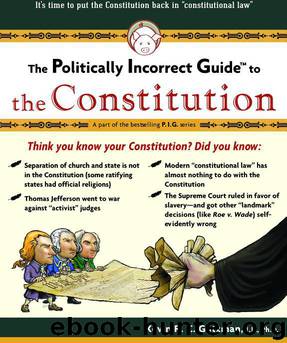Politically Incorrect Guide to the Constitution by Gutzman Kevin R C

Author:Gutzman, Kevin R C [Gutzman, Kevin R C]
Language: eng
Format: epub, mobi
Tags: Patriot Bookshelf
ISBN: 1596985054
Amazon: B002HRFNI8
Publisher: Regnery Press
Published: 2012-11-06T06:00:00+00:00
Legal Latinisms
Habeas corpus: Latin for "you have the body." The primary function of a writ of habeas corpus is to release someone from unlawful imprisonment. It directs the person holding a prisoner to either justify the detention to a court or release him.
As the amendment wended its way toward "ratification," three northern states that had ratified it rescinded their ratifications. In the South, every state except Tennessee at first voted not to ratify, then changed their votes under congressional threat. Only Mississippi held out.
In Tennessee, when opponents of the Fourteenth Amendment absented themselves from the state house-in order to deny proponents a quorum-two absent members were arrested. They secured a court order that they be released pursuant to a writ of habeas corpus, but the House ignored the writ, held them in a cloakroom, overruled the House Speaker's decision that they were not present, and voted to ratify the amendment.
In Oregon, the Republicans had a clear majority in the Senate but only a narrow one in the state's House of Representatives. Two Republican representatives whose elections had been challenged were seated, and they accounted for the margin of ratification. Their seats were later awarded to Democrats, and ratification was rescinded.
By the time the first southern states took up the matter, five northern states had "ratified." Texas led the way among southern states: the Texas Senate voted no by twenty-seven to one, and the House joined in by seventy to five. Two weeks later, Georgia's Senate voted no unanimously; its House had only two aye votes. Florida, Arkansas, and the Carolinas joined in by similar-or even greater-margins. (In Florida, both houses were unanimous in rejecting the amendment.)
California's governor refused to call a special session to consider the matter. Virginia, Alabama, Mississippi, Louisiana, Kentucky, and Delaware all added their votes to the nay column. Maryland followed next. Ohio and New Jersey would soon rescind their ratifications.
In March 1867, Congress used the Reconstruction Act to extort ratification of the Fourteenth Amendment. State ratification of the Fourteenth Amendment, Congress declared, must precede readmission of the states to the Union; until that had been achieved, there were "no legal state governments" in the South. Oddly, this pronouncement applied even to the six former Confederate states whose votes had counted toward ratification of the Thirteenth Amendment. It also overturned Lincoln's entire rationale for the war-that the southern states had never actually seceded, because they could not do so. Congress now said that they had seceded, which meant that the "civil war" had really been a war of conquest against a foreign country (the Confederacy), and Congress could now set the terms by which the Confederacy's states could be forcibly returned to the Union.
Meanwhile, in Ex parte Milligan (1866), the Supreme Court greatly restricted the ability of the executive branch to enforce its will in wartime. Lambdin P. Milligan had been charged with conspiring to seize federal munitions and to free Confederate prisoners. Justice David Davis, for the unanimous Court, said that the Constitution was not suspended in wartime, but applied "equally in time of war and peace.
Download
Politically Incorrect Guide to the Constitution by Gutzman Kevin R C.mobi
This site does not store any files on its server. We only index and link to content provided by other sites. Please contact the content providers to delete copyright contents if any and email us, we'll remove relevant links or contents immediately.
The Secret History by Donna Tartt(19097)
The Social Justice Warrior Handbook by Lisa De Pasquale(12193)
Thirteen Reasons Why by Jay Asher(8915)
This Is How You Lose Her by Junot Diaz(6891)
Weapons of Math Destruction by Cathy O'Neil(6282)
Zero to One by Peter Thiel(5805)
Beartown by Fredrik Backman(5761)
The Myth of the Strong Leader by Archie Brown(5511)
The Fire Next Time by James Baldwin(5451)
How Democracies Die by Steven Levitsky & Daniel Ziblatt(5221)
Promise Me, Dad by Joe Biden(5155)
Stone's Rules by Roger Stone(5089)
A Higher Loyalty: Truth, Lies, and Leadership by James Comey(4965)
100 Deadly Skills by Clint Emerson(4929)
Rise and Kill First by Ronen Bergman(4792)
Secrecy World by Jake Bernstein(4755)
The David Icke Guide to the Global Conspiracy (and how to end it) by David Icke(4721)
The Farm by Tom Rob Smith(4516)
The Doomsday Machine by Daniel Ellsberg(4492)
